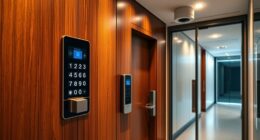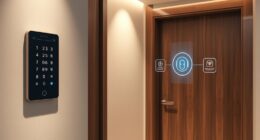Investing in a home security system is definitely worth the money. These systems not only deter about 80% of burglars but also offer peace of mind that your home is protected. You could potentially save around $2,000 on losses from burglaries and even lower your homeowners insurance by up to 15%. Installation can be affordable, with basic setups starting at around $140. Plus, the mental health benefits from feeling safe at home cannot be overlooked. If you’re curious about the different options and how they work, there’s plenty more to consider.
Key Takeaways
- Home security systems can deter approximately 80% of burglars, enhancing the safety of your home.
- Investing in a security system can reduce average burglary losses by around $2,000.
- Homeowners may save up to 15% on insurance premiums with a monitored security system, offsetting costs.
- Basic security setups start as low as $140, making them accessible for various budgets.
Value of Home Security Systems
Home security systems offer considerable value by deterring about 80% of burglars who check for security measures before attempting a break-in.
When you invest in these systems, you gain peace of mind knowing your home is protected. Additionally, integrating smart technology, such as garage door openers, can further enhance your home's security.
The average cost of installing a home security system hovers around $600, but you can find DIY options starting as low as $200, making it accessible for nearly any budget.
Moreover, many homeowners find that having a monitored security system can lead to a reduction in homeowners insurance premiums by up to 15%. Insurers recognize the added security these systems provide, which translates to savings for you.
In addition to deterring break-ins, extensive home security systems can greatly reduce the average financial loss per burglary by about $2,000, protecting your valuable items and investments.
With features like professional monitoring, alerts for smoke, and carbon monoxide emergencies, these systems not only safeguard against theft but also enhance your overall safety.
Ultimately, investing in a home security system proves to be a wise decision for protecting your home and peace of mind.
Benefits of Investing in Security

Investing in a robust security system not only protects your property but also enhances your overall peace of mind. Home security systems serve as a powerful deterrent against criminal activity, with about 80% of burglars checking for them before attempting a break-in. This means your investment can greatly reduce the risk of theft and loss.
Properties equipped with these systems experience an average loss of $2,000 less during burglaries compared to those without. Additionally, having a secure environment can positively impact mental health, as feeling safe at home reduces stress and anxiety, which is essential for overall well-being, especially for those at risk of mental health support.
Moreover, many security systems come with professional monitoring, allowing you to keep an eye on your home from anywhere. This capability provides reassurance, especially during your absences. Moreover, environmental sensors included in these systems alert you to smoke and carbon monoxide emergencies, improving your household's safety beyond just theft protection.
On the financial side, insurance companies often reduce homeowners insurance premiums by up to 15% for those with security systems. This can offset the security system cost over time, making it a smart investment.
Ultimately, investing in home security not only safeguards your belongings but also fosters a safer living environment for you and your loved ones.
Breakdown of Security Costs

How much should you expect to spend on a security system? The costs can vary widely based on your security needs.
On average, installation costs for home security systems hover around $600, though DIY packages are available starting at about $200.
With the rise of credit card debt in the U.S., understanding the financing options available for these systems is vital, especially when considering online payment solutions for your purchase understanding credit card impacts.
If you opt for a monitored system, be prepared for monthly monitoring fees, which typically range from $20 to $60.
Don't forget to factor in activation fees, which can reach up to $230.
If you're looking for thorough security systems, costs can exceed $1,200, depending on the features and equipment you choose.
Basic equipment costs for complete systems fall between $140 and $600, and if you want standalone devices—like cameras or motion sensors—these start at around $80 each.
How Security Systems Function

Home security systems work wirelessly, connecting to your home WiFi and using radio signals for flexible installation.
With the rise in cybersecurity threats, it's crucial to evaluate how these systems protect against potential breaches, similar to how cybersecurity measures safeguard sensitive data.
You'll find key components like control panels, sensors, and cameras that all collaborate to keep your space secure.
Understanding how these elements function together can help you see the value in investing in a reliable system.
Wireless Operation Mechanism
Wireless security systems operate seamlessly by utilizing your home's WiFi and radio signals to connect various devices without the hassle of complex wiring. This wireless setup makes it easy for you to install home security systems on your own, without needing a professional. You can effortlessly place security cameras, door and window sensors, and motion sensors throughout your property, enhancing your monitoring capabilities.
Additionally, maintaining a clean indoor environment with the help of air purifiers can further improve your home's safety by reducing allergens and harmful particles.
One of the standout features of these systems is their battery backup, ensuring they remain operational during power outages. This reliability gives you peace of mind, knowing your home is protected regardless of external circumstances. Additionally, motion sensors are designed to detect unauthorized movement, triggering alerts that keep you informed in real time.
Remote access is another major benefit of wireless security systems. With a smartphone app, you can view live footage from security cameras and access recorded video from anywhere, making it easier than ever to keep an eye on your home.
Key System Components
What key components make up an effective security system that keeps your property safe and secure? Home security systems rely on several vital elements working together.
At the core, you'll find control panels that serve as the main interface for managing your system.
Door and window sensors detect breaches, alerting you to any unauthorized entry.
Motion sensors activate alarms when they sense unexpected movement, providing an immediate response to threats.
Additionally, many homeowners opt for professional installation services to guarantee ideal placement and functionality of these components, as suggested in key factors in choosing a home cleaning service.
Security cameras play an important role, allowing you to monitor your property visually. Whether you're watching live footage or reviewing recorded events, you can stay informed through smartphone apps.
Additionally, environmental sensors, such as smoke and carbon monoxide detectors, enhance your safety by alerting you to hazardous conditions.
Most systems operate wirelessly, using your home WiFi and radio signals, which simplifies installation.
They often integrate alarms and mobile alerts for a thorough, multi-layered approach to security.
By combining these components, you create a stronger defense against potential intrusions, guaranteeing your peace of mind.
In short, understanding these key elements helps you appreciate the value of investing in a robust home security system.
Essential Components of Systems

When choosing a home security system, you'll want to reflect on its key features, like control panels, sensors, and cameras.
Each component plays an essential role in protecting your home, and conducting thorough background checks on service providers can further enhance your security measures.
Understanding the cost versus benefits can help you make an informed decision.
Let's explore what you need to know to get the most value for your investment.
Key System Features
A reliable home security system includes essential components like control panels, sensors, and cameras to guarantee your safety and peace of mind. When choosing a system, consider these key features:
- Control Panels: The main interface to arm or disarm your home security system and receive alerts.
- Door and Window Sensors: These create magnetic fields to detect unauthorized entry, triggering alarms when breaches occur.
- Motion Sensors: They detect unexpected movement indoors, activating alarms to enhance security.
Additionally, environmental sensors, such as smoke and carbon monoxide detectors, provide vital alerts for hazardous conditions in your home.
Many systems also offer a monitoring service, providing you with professional assistance in emergencies.
For best performance, you might want to invest in professional installation, ensuring everything is set up correctly and efficiently.
Cost Vs. Benefits
Investing in a home security system offers significant benefits that often outweigh the initial and ongoing costs, making it a smart financial decision for homeowners.
While the average installation fees for home security systems can be around $600, you can find DIY packages starting at just $200, allowing you to choose a system that fits your budget. Monthly fees for monitoring services typically range from $20 to $60, but these costs can be partially offset by discounts on homeowners insurance, which may save you up to 15%.
A basic setup can be acquired for as low as $140, while more extensive systems may exceed $1,200. Regardless of the system you choose, the financial benefits are clear.
Investing in a security system can reduce your average loss per burglary by about $2,000, offering a substantial return on investment. Additionally, incorporating environmental sensors like smoke and carbon monoxide detectors enhances safety beyond just burglary prevention, adding even more value.
Ultimately, weighing the cost against these benefits reveals that a home security system isn't just an expense, but a crucial investment in your home's safety and financial security.
Types of Home Security Options

Homeowners have several security options to choose from, each with its own costs and benefits. Understanding these options can help you decide what fits your needs best. Here are some popular types of home security systems:
- DIY Systems: Start around $200, offering flexibility and self-monitoring.
- Professionally Installed Systems: Average installation costs of about $600, providing extensive coverage and professional monitoring.
- Monitored Systems: Involve monthly fees ranging from $20 to $60 for professional oversight, ensuring rapid response during emergencies.
If you're considering integrating smart home features, such as smart locks and cameras, keep in mind that while they enhance security, they may also increase your overall expenses.
Each option has its pros and cons, so take your time evaluating what suits your lifestyle, budget, and security needs.
Whether you prefer the hands-on approach of DIY systems or the peace of mind that comes with professionally installed systems and monitoring, there's a solution for you.
Factors Affecting Cost and Value

Understanding the types of home security options available sets the stage for evaluating the factors that influence their cost and value.
When contemplating home security systems, you'll notice that the initial investment can range from $250 to over $1,000, depending on the system's complexity and installation costs.
Monthly monitoring fees play a significant role in your ongoing expenses. Basic plans might start at around $20 per month, while more advanced services, including professional monitoring, can exceed several hundred dollars. The value of professional monitoring lies in rapid emergency responses, potentially reducing losses during a crisis.
Another factor to ponder is the activation fee, which can vary by provider.
Additionally, many homeowners enjoy discounts on insurance premiums, saving up to 15% over time, which can help offset your security system costs.
Frequently Asked Questions
Is Getting a Home Security System Worth It?
Getting a home security system's definitely worth it. It protects your valuables, deters burglars, and can lower your insurance premiums. Plus, professional monitoring guarantees quick emergency responses, giving you peace of mind and enhancing your safety.
Is a Home Security System a Good Investment?
A home security system's a smart investment. It protects your valuables, deters burglars, and can even lower your insurance premiums. Plus, you'll enjoy peace of mind knowing your home's safer when you're away.
What Are the Disadvantages of Home Security System?
You might think a home security system guarantees safety, but the costs add up. False alarms can frustrate you, while determined burglars might easily bypass your defenses, leaving you feeling vulnerable despite your investment.
Does a Security System Add Value to a Home?
Yes, a security system can add value to your home. It enhances safety, attracts buyers, and may even lower insurance costs. Plus, properties with modern security features often command higher market prices, increasing your investment's worth.
Is There a Financial Benefit to Investing in a Home Security System?
Investing in a home security system benefits not only your peace of mind but also your wallet. Many insurance companies offer lower premiums for homes with security systems, saving you money in the long run. Additionally, a secure home can increase property value, providing a financial benefit when it’s time to sell.
Conclusion
In summary, investing in a home security system can be well worth the money.
Did you know that homes without security systems are 300% more likely to be burglarized?
By installing a security system, you not only protect your property but also gain peace of mind.
With various options available, you can find a solution that fits your budget and needs.
Overall, the benefits of enhanced safety and potential savings on insurance make it a smart choice.









